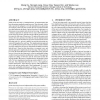Free Online Productivity Tools
i2Speak
i2Symbol
i2OCR
iTex2Img
iWeb2Print
iWeb2Shot
i2Type
iPdf2Split
iPdf2Merge
i2Bopomofo
i2Arabic
i2Style
i2Image
i2PDF
iLatex2Rtf
Sci2ools
CCS
2015
ACM
2015
ACM
UCognito: Private Browsing without Tears
While private browsing is a standard feature, its implementation has been inconsistent among the major browsers. More seriously, it often fails to provide the adequate or even the intended privacy protection. For example, as shown in prior research, browser extensions and addons often undermine the goals of private browsing. In this paper, we first present our systematic study of private browsing. We developed a technical approach to identify browser traces left behind by a private browsing session, and showed that Chrome and Firefox do not correctly clear some of these traces. We analyzed the source code of these browsers and discovered that the current implementation approach is to decide the behaviors of a browser based on the current browsing mode (i.e., private or public); but such decision points are scattered throughout the code base. This implementation approach is very problematic because developers are prone to make mistakes given the complexities of browser components (incl...
| Added | 17 Apr 2016 |
| Updated | 17 Apr 2016 |
| Type | Journal |
| Year | 2015 |
| Where | CCS |
| Authors | Meng Xu, Yeongjin Jang, Xinyu Xing, Taesoo Kim, Wenke Lee |
Comments (0)

